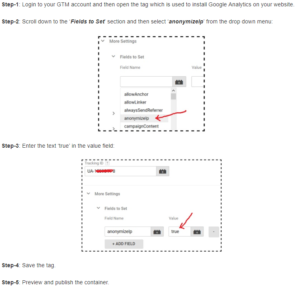Many companies use Google Analytics as their assistive tool in order to collect valuable information about customer behaviour on websites, mobile apps etc. By default, Analytics uses the entire IP address of website users to provide general geographic reporting. The report also shows users’ language, used browser, operating system, service provider and resolution.
Why IP anonymization is needed?
Under GDPR, an IP address is considered as personal data. Even though those IP addresses do not show up on Google Analytics reports, visitors ID still can be tied to IP address owner’s personal information outside of Google Analytics.
Google has provided IP anonymisation function to allow website owners to request that all of their users’ IP addresses be anonymised within Google Analytics. This feature is designed to help site owners comply with their own privacy policies, recommendations from local data protection authorities and legal regulations like the GDPR, which may prevent the storage of full IP address information.
How to anonymize a users’ IP?
The IP Anonymisation feature in Google Analytics is not enabled by default. Therefore, when a customer of Google Analytics requests IP address anonymisation, Analytics anonymises the address as soon as technically feasible at the earliest possible stage of the collection network. As a result of that website, the owner does not have to ask consent from users inside Cookie Policy.
In order to prevent the collection of personal data from your website’s Google Analytics tracking code, anonymise your website users’ IP addresses. It can be done by making a change in web’s/app’s code or by adding a new variable in GTM tag (step-by-step instructions). It can also be enabled via Google Tag Manager as shown in the picture below.
Anonymization of IP address might impact geolocation tracking data at the city level. However, there is no noticeable difference in accuracy at the continent or country level.
More to read on this topic: The lawful basis for Data Processing under the GDPR













